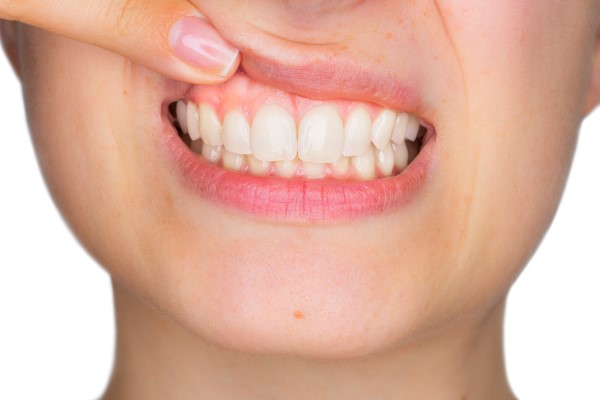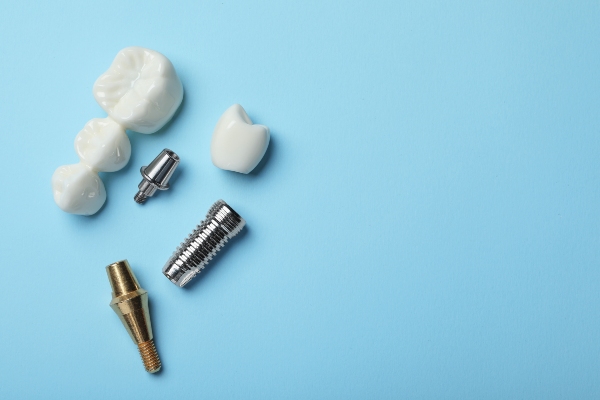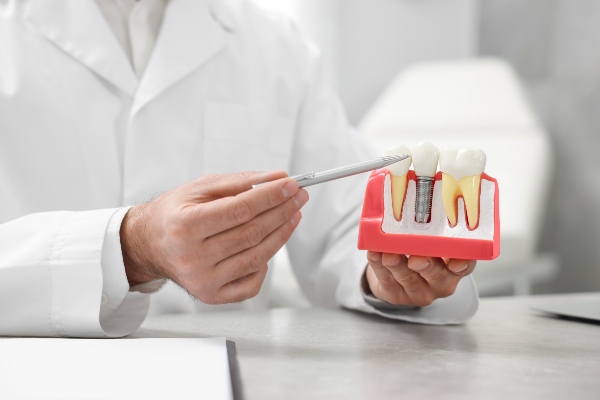Routine Dental Checkups Can Help Prevent Gum Disease

Dentists recommend proper oral hygiene from a young age to achieve good dental health for a lifetime. This is important for cosmetic reasons, but also to maintain overall health. One of the consequences of not brushing and flossing correctly is gum disease, which is also known as periodontal disease. This condition originally affects the gums, but it can progress to involve the teeth and even lead to bodily infection if left untreated. There are three stages of gum disease, and symptoms range from mild to severe.
Having regular dental checkups is important for many reasons, and preventing periodontal disease is one of them. During the early stages of the disease, there may be few, if any, symptoms, so a patient often is not aware of the problem. During an office visit, however, a dentist can detect the issue and treat it before it becomes worse. The dental cleaning during the visit also helps prevent gum disease in the first place.
Stages of gum disease
It is critical to catch gum disease as soon as possible. It is feasible to treat and reverse it at an early stage, but if it progresses to the advanced phases, it is impossible to reverse.
Gingivitis
When bacteria in the mouth is able to thrive, it becomes plaque, which can harden into tartar if not removed from the teeth. Tartar that collects on and between the teeth and along the gum line leads to gingivitis, which is the first stage of periodontal disease. While gingivitis often occurs without noticeable symptoms, patients may see some gum tenderness, redness, or swelling. While bleeding gums can occur normally as a result of hormonal changes or trauma from eating hard foods, flossing too vigorously, or brushing with the wrong type of toothbrush, frequent bleeding from normal brushing or flossing is generally a sign of gingivitis.
Periodontitis
If gingivitis is left untreated, it progresses to the second stage of gum disease, which is called periodontitis. At this phase, the bacteria that has collected under the gums release toxins that cause an infection. This can lead to receding gums and cause the teeth to appear longer than normal. The mouth may also look like pockets have formed between the teeth and gums. These pockets further trap food, which results in more bacteria buildup. Over time, bone loss begins to occur.
Advanced periodontitis
At this advanced stage, the accumulation of tartar has increased the release of toxins under the gum line, leading to the loss of bone and deterioration of connective tissue. This results in the affected teeth loosening, which can cause changes to the fit of the teeth when biting down. There is also advanced infection in the mouth, which may show up as white pus along the gums. In the severe stages of periodontitis, tooth loss is common, which further weakens the bone structure in the gums and causes additional stress on the remaining teeth. By this time, usually, the only options are surgery, tooth extraction, and antibiotics.
Steps involved in a dental checkup
A checkup generally consists of a professional cleaning and a thorough exam. The cleaning can help prevent gum disease because it thoroughly removes stubborn plaque and tartar that regular brushing does not dislodge. By removing bacteria, it cannot build up underneath the gums and cause infection.
During the exam, the dentist looks at the patient's teeth, tongue, and soft tissues of the mouth, including the gums. X-rays may also be taken. Because the patient often does not notice any symptoms during the early stages of gum disease, the dentist can pick up signs during the exam. These may include recessed or swollen gums. If gum disease is found, often a deeper cleaning will be recommended to prevent the condition from getting worse.
Conclusion
Gingivitis in the earliest stages of gum disease is relatively common. This condition is easy to treat with proper brushing, flossing, rinsing, and thorough professional cleaning. Although it is sometimes difficult to detect, an awareness of the symptoms can help patients to identify the subtle signs and help them make sure the condition does not progress to the advanced stages of periodontitis. Fortunately, gum disease follows a slow progression before irreversible damage and tooth loss become serious issues. Taking part in routine dental checkups twice a year with a trusted professional can help to prevent gum disease from forming in the first place, as well as diagnose it in the beginning stages and stop it from reaching the point of no return.
Request an appointment here: https://www.carolinasmilesdentist.com or call Carolina Smiles Family Dental at (828) 974-3326 for an appointment in our Brevard office.
Check out what others are saying about our dental services on Yelp: Gum Disease in Brevard, NC.
Recent Posts
According to a study conducted by the Centers for Disease Control (CDC), more than 47 percent of adults 30 and older have some form of gum disease. Fortunately, gum disease can be treated and often reversed in most cases. Dealing with gum disease should include improvements in oral hygiene, making smart dietary choices, and regular…
Gum disease is very common in the United States, which often leads many to believe it is not as serious of a concern as it actually is. However, gum disease should be taken seriously, and learning more about it can help you determine why it is important to treat and prevent gum disease in order…
Like cavities, gum disease is a common dental dysfunction that affects people of all ages. If you are suffering from gum disease, you should not put off getting treatment. Your general dentist has the knowledge and training to relieve the symptoms of this disease. In some cases, the dentist might be able to reverse its…
No one is immune to gum disease. When it comes to oral health, the teeth tend to get more attention than the gums. What many people do not realize is that it is not just about having straight teeth, a white smile, or cavity-free teeth; the gums also need to be in good condition. Knowing…


